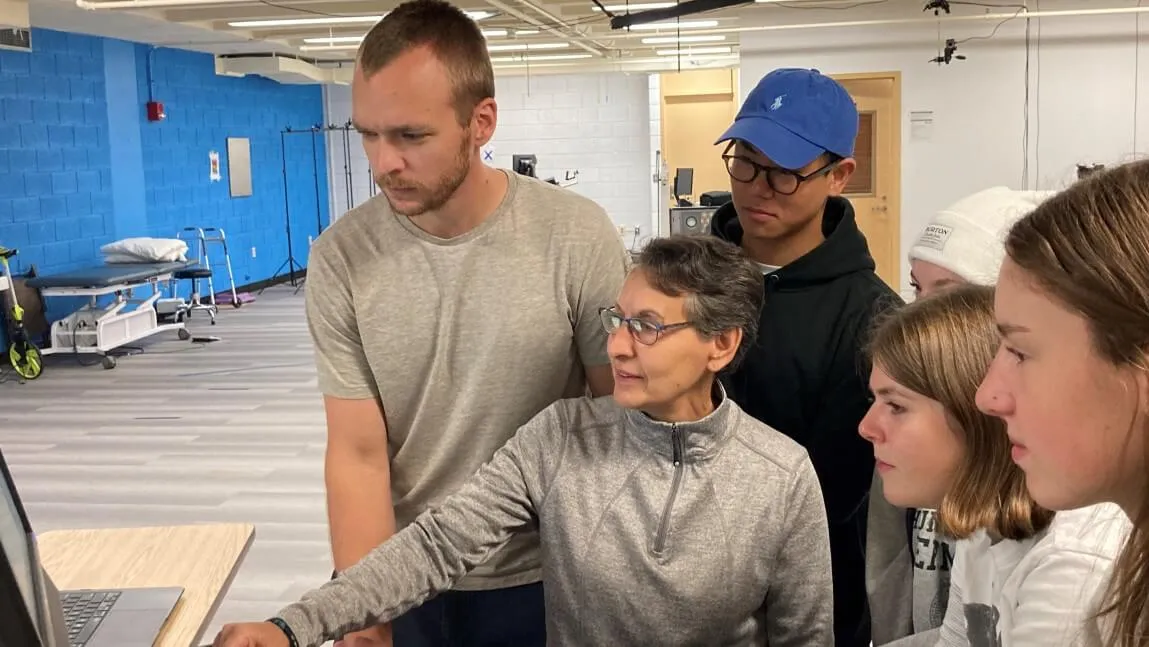It’s Friday afternoon and mostly quiet inside the Human Motion Analysis Lab on the third floor of Rowell Building, where Susan Kasser, Ph.D., and her team study balance and mobility in adults with chronic conditions. A path of biomechanical force plates used to measure gait spans the floor. Nearby, equipment that can assess the muscle and brain activity involved in movement sits idle as a group of student researchers huddles around a computer monitor to examine their collected data.
Myeongjin Bae and Michael Van Nostrand – doctoral candidates in UVM’s Interprofessional Health Sciences program – lead the data discussion with a team of undergraduate research assistants. The group is studying the impact of attentional focus on walking in individuals with multiple sclerosis (MS) to understand better its role in an individual’s mobility and fall risk.
Both Bae and Van Nostrand came to UVM specifically for the opportunity to conduct research with Kasser, whose work focuses on examining the underlying mechanisms of postural control and evaluating targeted interventions to mitigate balance impairment and reduce falls for people with MS. For the past 25 years, Kasser has also directed an individualized exercise program to enhance independence, balance, and mobility for individuals living with the chronic condition. Called IDEAL (Individually Designed Exercise for Active Lifestyles), the program offers important therapeutic services to community participants while providing valuable clinical and research experiences for students in the Exercise Science and Interprofessional Health Sciences programs.
Undergraduate and graduate students work side-by-side in Kasser’s lab and community programs, with the more experienced students helping to orient newer participants and program volunteers. Providing students with these hands-on experiences in research and practice fosters the development of creative problem-solving, analytical, and critical thinking skills at a much deeper level than what is possible to achieve in the classroom, Kasser said.
“By assisting with research, students better understand the process of systematic inquiry and see, first-hand, that how we answer questions is just as important as what questions we ask,” said Kasser. “They develop competence and confidence in handling and mastering challenging tasks and learn to work with uncertainty and overcome obstacles when things do not always go as planned.”
The benefit works both ways: the students bring fresh perspective and new ideas to Kasser's work and empower participants in the community exercise programs to serve informally as teachers by sharing the strategies they use to navigate their daily lives.
From her students' perspective, Kasser’s generosity in sharing her expertise through mentorship is clear. Bae, who has worked with Kasser since coming to UVM from the University of Seoul in 2021, said he values the encouragement she gives him to become a critical thinker and an independent researcher. Van Nostrand echoes this perspective.
“When I first came to UVM, I was excited to work with a mentor who shared my ideas about research and the community,” said Van Nostrand. “But what I got was so much more than that. I have a mentor who supports me, pushes me to be better, and cares about my success as a student and a professional.”
Professor Sue Kasser is the recipient of the 2022 Patricia A. Prelock Nursing and Health Sciences Research Award, given in recognition of her interdepartmental research program and commitment to mentoring.
